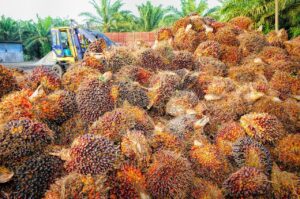Palm oil is a versatile substance used in a wide range of products from foods to cosmetics. The trouble with it is that the cultivation of oil palm trees has caused massive enviromental harm, especially in Malaysia and Indonesia, which together account for 85% of palm oil production in the world.
But scientists from Nanyang Technological University in Singapore and the University of Malaya in Malaysia say they have an answer as to how we can wean ourselves off palm oil.
The researchers have extracted edible oils from a common strain of microalgae that have similar properties to palm oil but contain fewer saturated fatty acids. That feature will have health benefits as saturated fats raise levels of LDL cholesterol in our blood, thereby increasing the risk of heart disease.
Better yet: these microalgae can be cultivated at scale, obviating the need for further deforestation to plant yet more oil palms.
At the same time, the researchers have developed a relatively simple technique to replace the microalgae culture medium with fermented soybean residues while improving microalgae biomass yields. After two weeks the cultured microalgae is washed and dried before being treated with methanol to break down the bonds between the oils and the algae protein. That enables the oils to be extracted through an environmentally friendly processing technology also devised by the scientists.
For a standard 100-gram bar of chocolate, for instance, 160 grams of microalgae would suffice in providing the oil, the scientists say.

“Uncovering this as a potential human food source is an opportunity to lessen the impact the food supply chain has on our planet,” stresses William Chen, director of NTU’s Food Science and Technology Program and head of the research team, who published their findings in a study.
“Our solution is a three-pronged approach to solving three pressing issues. We are capitalising on the concept of establishing a circular economy, finding uses for would-be waste products and re-injecting them into the food chain, Chen explains.
“In this case, we rely on one of nature’s key processes, fermentation, to convert that organic matter into nutrient-rich solutions, which could be used to cultivate algae, which not only reduces our reliance on palm oil, but keeps carbon out of the atmosphere,” the scientist adds.
The reseachers are working on fine-tuning their methods to improve the yield and quality of oils extracted from microalgae and are expecting their inventions to become commercially viable in a couple of years.
In another encouraging development, Unilever, a British multinational corporation, is launching a new $120 million biotech venture with the aim of creating a substitute for palm oil from a new fatty alcohol made from fermented sugar for use in beauty products.
“The opportunity to offer the same great cleaning [properties], but with an even smaller environmental impact is hugely exciting,” says Richard Slater, Unilever’s chief research and development officer.
“In this pilot stage, we are using sugar from certified sustainable sources. Sugar is a highly versatile and quick growing crop that can be cultivated everywhere meaning that in the future, we can source our base ingredient close to the production plant,” Slater explains. “This means we can also reduce the carbon footprint associated with transporting the materials to be processed.”
Such initiatives aimed at replacing palm oil with greener substitutes cannot come soon enough as deforestation in Sumatra, Borneo and elsewhere in Indonesia and Malaysia have reached massive proportions with huge environmental costs. Critically endangered endemic species such as orangutans and Sumatran rhinos have been pushed by habitat loss to the very edge of extinction.
“If the current destruction of the rainforest continues, then I have absolutely no hope that any orangutans will remain in the wild,” warns Alan Knight, chief executive of the conservationist group International Animal Rescue. “I would probably say 10 years if we cannot stop the destruction. I think the Sumatran [orangutan] will go before then if they don’t sort out the situation they are in.”
According to the World Wide Fund for Nature’s Malaysian chapter (WWF-Malaysia), wild populations of critically endangered orangutans in patches of forest located in landscapes remade by oil palm estates in the Malaysian state of Sabah have plummeted by up to 30% in just 15 years, based on an aerial survey of orangutan nests.
Although orangutan populations in the interiors of remaining forests have remained stable, they have been declining to varying degrees in patches of forest interspersed by oil palm plantations, which are a primary source of revenue for Malaysia.
At the same time, Indonesia, the world’s top palm oil producer, is stepping up its plans to ship millions of tons of crude palm oil and its derivatives after a self-imposed three-week ban on exports in May to tackle domestic shortages. As the global market continues being flooded by palm oil, rainforests in Indonesia and Malaysia remain at grave risk of being fragmented further.
In order to give these remaining forests and their inhabitats a fighting chance at survival, we’ll need to find ecofriendly substitutes to palm oil as soon as possible.
Did you like it? 4.4/5 (30)








